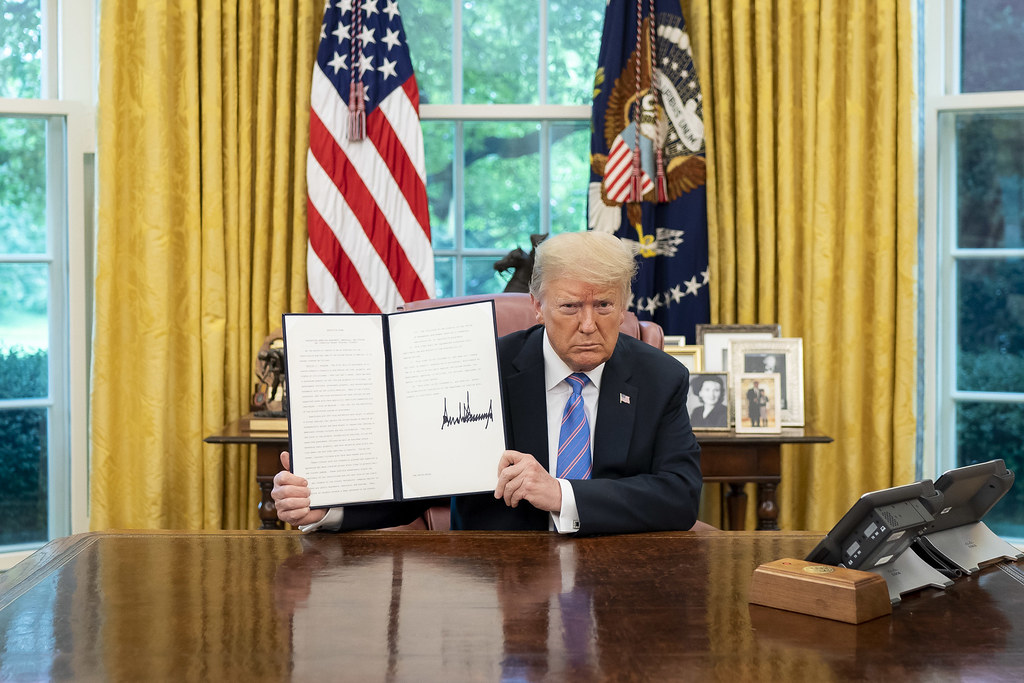The recent election has caused widespread hope and concern between Democrats and Republicans alike. President-elect Donald Trump has made a variety of promises in order to regain office, but one of the vows that has sown the most division is his oath to dismantle the Department of Education (DE).
The DE is a relatively new addition to the country’s bureaucratic agencies. It was first established in 1867 but was quickly demoted from its department status to the Office of Education. This was due to worries that the department would exercise too much control over the states and their individual education systems.
Between the 1960s and 1980s, however, various movements spurred legislation and created programs involving the school system within the federal government. For example, in the ‘60s, President Lyndon Johnson created programs such as the Elementary and Secondary School Act (ESEA) to help poor students gain a better education as a part of his “War on Poverty.” In the 70s, various movements formed to gain equal access to education for historically marginalized groups such as women and African Americans, with one of the most prominent pieces of legislation, the Individuals with Disabilities Act (IDEA), making historic impacts on education for people with disabilities.
This widespread usage of federal government power to shape the American education system eventually led to the DE being once again promoted to department status in October 1979, when Congress passed the Department of Education Organization Act (Public Law 96-88).
This act established the DE in order to ensure equal access to education for American citizens and support the states in effectively carrying out their educational responsibilities. Today, the department also conducts research and evaluates ways to improve the education system in this country. Additionally, the agency is used to promote public involvement in education and ensure that elected officials will not have complete control over decisions within each individual school system.
Since the department began operations in May 1980, people across the country have been rooting for it to be dismantled again. Republican president Ronald Reagan promised to shut down the department all the way back in 1981 when he was first campaigning to be president. Now, years later, Trump is promising to take the same action when he takes office.
Negative opinions towards the DE do not just come from past generations though. Some students today also hold a relatively pessimistic attitude towards the DE. Linganore High School (LHS) junior Kaelyn Bass believes the department has a lot it could work on if it continues to operate.
“I think we need to have more help for mental issues, and then also funding definitely needs to be distributed more fairly,” Bass said.
While some citizens may be alarmed at this rhetoric, the likelihood of a shutdown is relatively small in the grand scheme of things. Practically every Republican president since 1979 has attempted to close the department, and all have failed. Ultimately, it is not the president who decides to open or close a bureaucratic agency; it is actually the members of Congress who have this power.
In order to shut down an agency, both houses of Congress – the Senate and the House of Representatives – would need to have a majority vote approving the decision, something that can be very difficult to obtain.
In fact, Trump made a similar promise during his 2016 presidential campaign, even having his administration release a proposal that would have merged the DE with the Department of Labor.
This is good news for many left-leaning individuals who are worried about what a potential dismantling could mean for learning about equality and accepting an individual’s sexuality within schools.
Urbana High School senior and trans-student, George Zurawski, stated that currently schools are in general having a fairly positive outlook towards learning about gender, sex, and sexuality, but fears what a dismantlement could mean for these topics.
“I do worry for future kids of our age and adults that there could be a disconnect due to the possibility of it [the DE] being dismantled as those topics [sexuality], while being based in social intelligence, are also heavily based biology as well and should not be something that is censored,” Zurawski said.
The department’s job is not only to assist trans students within school though. A major role of the DE, and one of the reasons it was renamed a department, is to help ensure access to education for students with disabilities.
Susan Stevens, a special education co-teacher supporting seventh grade students at Rosa M. Parks Middle School states that (IDEA) helps to guarantee that students with disabilities receive both a free and appropriate public education.
According to Stevens, the dismantling of the department will not have a negative effect on IDEA; “This is really an issue of semantics, because whether eliminating the education department has an effect on students with disabilities, one way or another, we are still mandated by law to provide special education services supports and programs.”
Both sides of the argument offer many examples of how the department shutdown can be both helpful and harmful, but most believe that it will be one or the other.
However, according to Alberto Betancourt, a representative of the press and customer relations division of the DE, the dismantlement of the department could have numerous effects on the school system for a while, but may not be as disastrous as some might think.
Betancourt cited a memorandum detailing a contingency plan for a short-term shutdown of the DE, which would be similar to that of a permanent shutdown.
This document stated that should the department be shut down for more than a week, it could “severely curtail the cash flow to school districts, colleges and universities, vocational rehabilitation agencies, and other entities that depend on the Department’s discretionary funds to support their services.”
However, other concerns such as the impact to equal educational access for marginalized groups, will not be as big. The memorandum declares that programs still have the authority to continue the “obligations and payments from these programs,” meaning these initiatives would still be able to function without the help of the DE.
Overall, dismantling the Department of Education would require adjustment within individual state’s school systems, as they assume new responsibilities that once fell primarily to the DE. Should the department be dismantled, the roles of the DE will be allocated to the states and between other federal bureaucratic departments.
Ultimately–and to allay some concerns–, if the Department of Education is shut down, important tasks will still operate, just within the confines of different government agencies or within the states themselves.













